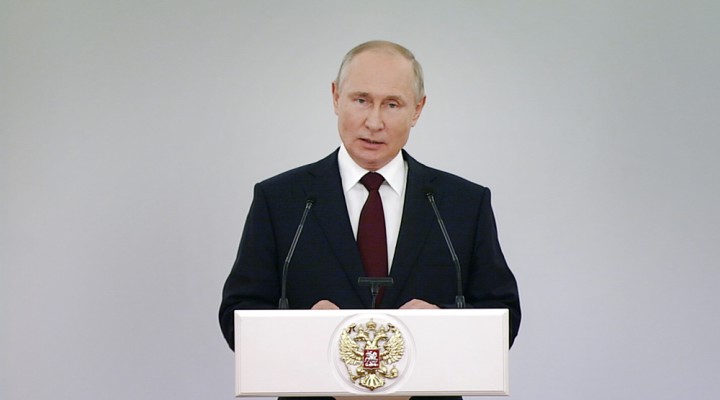Year two of the Ukraine war

Putin’s speech provided some important pointers
Along with millions of others in and outside Russia, I watched President Vladimir’s two-hour annual speech to the Federal Assembly on the first anniversary of the start of the Ukraine war. His powerful address gave no indication that he regrets launching the war or fears its consequences. On the contrary, he seemed certain of himself and his army’s eventual victory, determined to see it through, and unwilling to consider any other option.
This was a ‘rallying’ speech for the people and military alike, striking both nationalist and religious chords: He described the war in Russia’s historic borderlands as an existential threat aimed at destroying the country and its people, language, and culture — and also the values of its Orthodox creed, as though talking of a Western crusade.
The dominant feature of the speech was Putin’srepeated reiteration, directly and indirectly, that Russia is right and will fight to the end to recover and uphold that right. This signalled that there will be no early end to the war, and he won’t make concessions to achieve a peaceful solution at the expense of Russian territory. That means the annexation of the four Donbas regions and Crimea is permanent and not subject to compromise.
There are six main take-outs from the speech which could, reading between the lines, provide general pointers to future developments in the war and global security and stability.
(1) Putin’s announcement of the suspension of the new Stark treaty. That means resuming the nuclear race and lifting all controls on the possible use of nuclear weapons if deemed necessary.
(2) Putin gave a compelling account of how the Ukraine war began in which he placed the blame firmly on the West. He argued his troop deployment to Ukraine was a pre-emptive strike because the West — as former German chancellor Angela Merkel admitted — had used the 2014 Minsk agreement to pause the conflict in eastern and southern Ukraine to further arm and equip the Ukrainian military.
(3) Putin insisted the US and its allies sought, and still seek, to destroy Russia by creating a local conflict (in Ukraine) and turning it into a world war. He views that as an existential threat to Russia and his responses are based on that perspective.
(4) The Ukraine war will not end soon. Putin appealed to his compatriots to learn to live with it, and also with Western sanctions and to overcome them. He insisted Russia has enough reserve forces to carry on to the end. (Putin’s deputy on the national security council and unofficial spokesman, Dmitri Medvedev, elaborated by commenting that if Russia halts its ‘military operation’ without achieving its objectives there will be no Russia left, and what remains will be devastated and torn to shreds).
(5) These repeated references to the dismemberment, humiliation, and eradication of Russia could serve as prior justification for the use of nuclear weapons on grounds of legitimate self-defence by all available means.
(6) The presence of China’s top diplomat Wang Yi in the audience at Putin’s speech alongside Russia’s top brass affirms that China is on Russia’s side, even if it has taken a back-seat until now. This is an important indicator which will worry Western strategists. The TV cameras covering the speech repeatedly panned to him to underline that message.
Twelve months into the Ukraine war, the signs so far are that Putin is winning.EU foreign affairs chief Josep Borrell admitted as much when he said Russia’s economy was unexpectedly strong despite sanctions due to high energy prices and could cover all the costs of the war. The Russian military has remained cohesive and loyal, and Western hopes of fomenting large-scale anti-war protests proved illusory. There has been no mass exodus of Russians seeking to escape a war that barely affects most of them — unlike their Ukrainian cousins — and they watch on TV.
The most important development in the next few months may not be the much-anticipated Russian Spring Offensive but the prospect of China supplying Russia with arms. This could seriously offset the US ‘edge’ and Russian ‘deficit’ in military technology, especially Artificial Intelligence -based systems. China’s unpublicised capabilities in this regard could tip the balance both in the Ukraine war and a possible future war over Taiwan.
Year two of the Ukraine war could be replete with unhappy surprises for the US and NATO.
https://www.raialyoum.com/year-two-of-the-ukraine-war/
 TheAltWorld
TheAltWorld 
0 thoughts on “Year two of the Ukraine war”